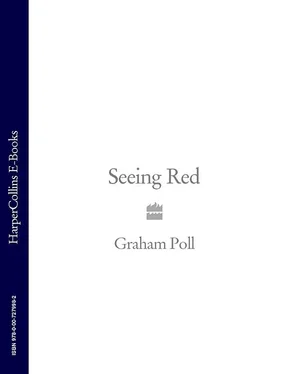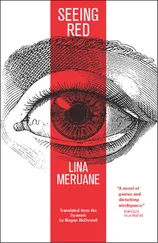Already under investigation by the Football Association after allegations made against him by Chelsea’s disgruntled players in defeat on Sunday, his penchant for the theatrical is stripping him of credibility, his apparent desire to be the centre of attention – he was signing autographs prior to kick-off – unhelpful when he attempts to officiate. He would argue, with some justification, that it was McFadden’s folly which prompted the red card, but it appears that he revels in the notoriety such controversy affords him.
Other reports pointed out that I was already in the spotlight over my ‘much-criticized decision’ to dismiss John Terry. Some reminded readers that Terry said he had been given two different versions of why he was shown a second yellow card and that team-mate Ashley Cole accused me of bias against his club. Very few reports bothered to add that I had denied the claims of Terry and Cole.
In the car on the way home, I turned on the radio – to hear a phone-in caller repeat the comment that I had indulged in an autograph-signing session before the previous night’s game. The caller said, ‘He’s Mr Big Time Charlie, Mr Superstar who loves the attention.’
The truth, if anyone is bothered about the truth, is that before the game and before the ground was open to the public, there were three or four lads by one of the dug-outs who were with one of the club officials. They asked for my autograph. I obliged. If I had not, then presumably I would have been a Big Time Charlie who thinks he is too important to bother with kids who want his autograph.
On the way home, as I drove off the M6 toll road and pulled onto the M42, I looked at my eyes in the rear-view mirror because I knew they were brimming up with tears. Alone with my feelings, my emotions had spilled over.
In any other period of my refereeing career, I would have been angered by the accusations and understandably upset by the crescendo of criticism, but I cannot imagine they would have made me tearful. Now, however, five rough days had brought confirmation of a truth I had been avoiding: I had fallen out of love with refereeing. Not football – I still loved football – but I no longer loved refereeing. That realization brought a dead weight of sadness.
Refereeing had been so important to me for half my life, but I had refereed the Everton game really well and yet still had my competence and integrity doubted. It was clear to me that my credibility was gone forever. The disillusionment and deep, deep disappointment I felt as I drove home from the city of Liverpool was intense and oppressive.
Earlier that week, on the morning of the Spurs–Chelsea game, Patrick Barclay had written a short little tribute to me as a ‘PS’ at the bottom of his column in the Sunday Telegraph . The brief article finished with two points which meant the world to me. I am not sure journalists realize how their words can hurt or heal. But, after referring to my three-card trick at the World Cup, Paddy wrote:
Two thoughts arise. The first is that I’d rather have a referee who makes an isolated technical mistake than one as weak as Stefano Farina proved in Barcelona last Tuesday. The other is that if England’s players, many of whom did far worse than Poll in Germany, were ever to show half the character he has displayed since the resumption of hostilities, they might yet win something.
I have chosen to reprint the piece of flattery from the Sunday Telegraph because of the contrast between the kind picture it paints of me and the state I was in a few days later, on that journey home from Liverpool. If Patrick Barclay had seen me close to tears in my car, he might have had less praise for my strength of character; or, I suppose, he might have understood how difficult season 2006/07 really was.
Soon after I reached my home, a woman reporter from The Times arrived at my door to ask some questions. I had given one interview, to Sky TV, in Germany after my Stuttgart misadventure and had taken a vow of silence since. So I asked The Times woman to leave. Unable to write anything much about me, she wrote some spiteful things about Tring. I was upset about that, because the people of the town had been very supportive.
It had not been a very good week so far. The next morning, Friday, a letter arrived, addressed on the envelope to ‘G Poll, Tring’. That was all. My instinct told me it would be abuse from a Chelsea supporter or a very quick Everton fan. I told myself not to open it, but I did. It was from a lad named Thomas from an address in Bishop’s Stortford, Hertfordshire. It said:
Dear Mr
Poll I am typing this on my dad’s computer. I am training to be a ref and am 14-years-old. I watched the game on Sunday and thought you had a good game. I think it is wrong for players to question referees decisions and I think it was god [sic] for you to tell the Chelsea players they needed to learn a lesson on discipline. It is not just them it is players from all teams. Some-times I think refs need to be stronger and tell these players these sort of things. Anyway got to go because my dad wants the internet. I haven’t got your address but I know you live in Tring so I hope you get this. I am reffing game on Sunday and will try and be like you.
Interestingly, even this young man assumed I had told Chelsea they needed to be taught a lesson. But his letter reminded me that I owed a responsibility to all the referees in the entire football pyramid. My responsibility to them was not to be broken or cowed by false allegations. Thomas cannot have known the positive effect his letter had on me. I wrote back to him, enclosing some refereeing ‘goodies’.
A little later that day, I headed back to the North-West to stay overnight ahead of my Saturday fixture: Manchester City versus Newcastle. The match was going to be live on Sky at lunchtime and they were billing it as, ‘Graham Poll’s next game’.
Somewhere between Stoke and Manchester, as I sat in the stationary queue of traffic which seems mandatory on the M6, I was telephoned by Brian Barwick, the chief executive of the Football Association. He wanted to draw my attention to some mildly supportive comment pieces in some newspapers. He said, ‘I hear you have been thinking about possibly giving up. Well, I hope you have been reading the more positive press coverage today.’
All my anger and frustration at his organization exploded. I told him how disappointed I was that Chelsea had not been charged with intimidation – a signal that it was all right to mob referees. I was doubly disappointed that nobody at Chelsea had been charged with anything for making allegations about my integrity. And I told him it was an absolute disgrace that the FA themselves had decided to investigate me and then had let that investigation drag on.
I said, ‘It is because the FA is not strong with people who say things about referees, and do these things to referees, that James McFadden believes it is OK to call me a cheat.
‘You, the FA, should have backed me straight away after the Tottenham v Chelsea game, or conducted a very quick inquiry. Then you, as chief executive of the Football Association, should have held a press conference saying it is wrong to question the integrity of referees.
‘You should have done that – not for me, but for every referee in the country. But you didn’t and so there will be 27,000 referees going out this weekend knowing that they cannot rely on the support of the Football Association. When a referee takes firm and correct action you don’t support him.’
Barwick huffed and puffed but didn’t know what to say. My final comment to him was a question. I asked, ‘How on earth do you expect me to go out and referee a football match tomorrow?’
Richard Scudamore, chief executive of the Premier League, also telephoned me and I asked him the same question. Scudamore said, ‘You will go out tomorrow and referee brilliantly as you always do.’
Читать дальше












